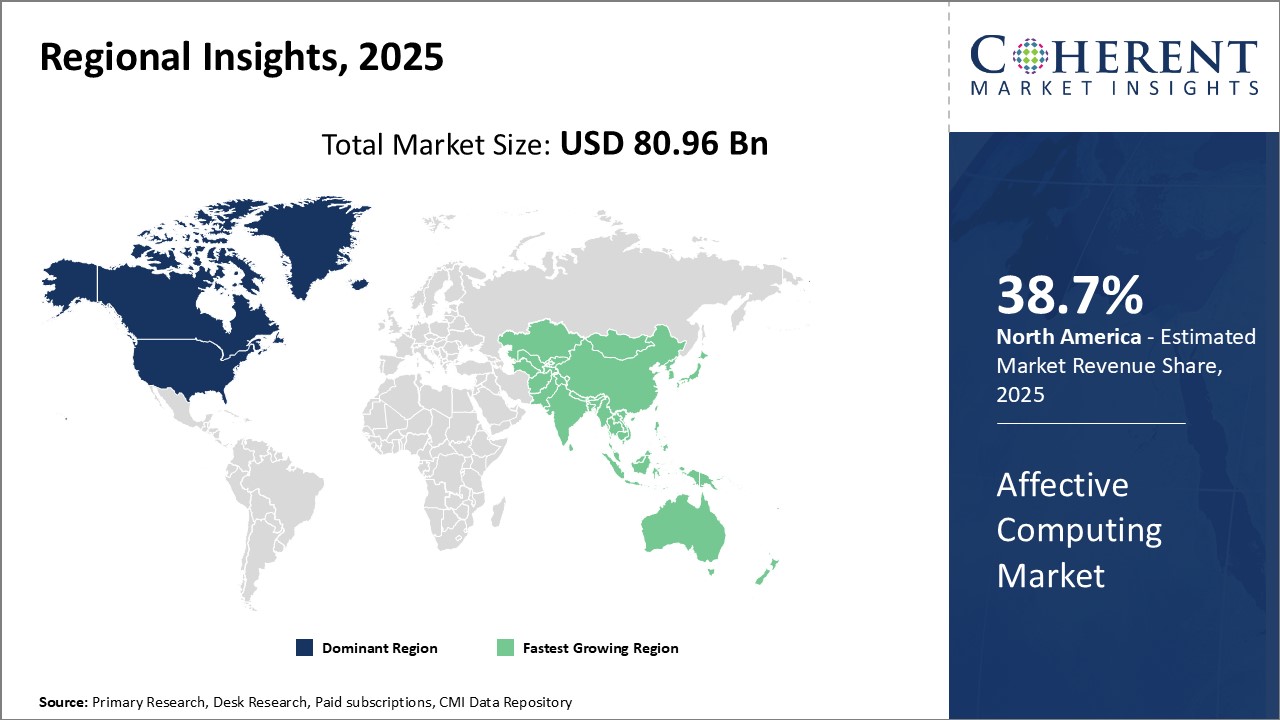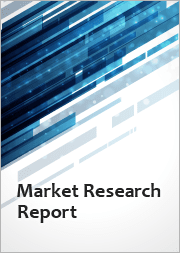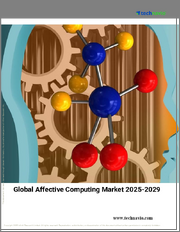
|
시장보고서
상품코드
1673875
감성 컴퓨팅 시장 : 컴포넌트별, 기술별, 최종 용도 산업별, 지역별Affective Computing Market, By Component, By Technology, By End-use Industry, By Geography |
||||||
세계의 감성 컴퓨팅 시장은 2025년에 809억 6,000만 달러로 추정되며, 2032년에는 3,755억 6,000만 달러에 달할 것으로 예측되며, 2025-2032년 연간 평균 성장률(CAGR)은 24.5%로 성장할 전망입니다.
| 보고 범위 | 보고서 상세 내용 | ||
|---|---|---|---|
| 기준연도 | 2024년 | 2025년 시장 규모 | 809억 6,000만 달러 |
| 실적 데이터 | 2020-2024년 | 예측 기간 | 2025-2032년 |
| 예측 기간 : 2025-2032년 CAGR | 24.50% | 2032년 금액 예측 | 3,755억 6,000만 달러 |

감성 컴퓨팅은 인공지능 과학의 한 분야로, 인간의 영향을 인식, 이해, 처리, 시뮬레이션할 수 있는 시스템의 설계를 다룹니다. 컴퓨터 과학, 심리학, 인지과학에 걸친 다학제적 분야입니다. 이 기술은 인간의 감정을 인식하고 이에 반응할 수 있는 인간 중심 시스템을 개발하는 데 중요한 역할을 합니다. 표정, 말투, 제스처, SNS 게시물, 생리적 신호 등 인간의 감정 표시를 실시간으로 분석합니다. 딥러닝과 AI의 발전으로 Affective Computing 시스템은 더 높은 정확도로 인간의 감정과 심리를 광범위하게 감지할 수 있도록 정교해지고 있습니다. 이러한 발전은 의료, 교육, 자동차, 미디어, 엔터테인먼트 등 다양한 분야에서 이 기술의 새로운 응용을 촉진할 것으로 기대됩니다.
시장 역학
세계 감성 컴퓨팅 시장은 인간화된 디지털 상호 작용과 경험에 대한 요구가 증가하면서 성장세를 보이고 있습니다. AI 기반 가상 비서 및 챗봇의 도입이 증가함에 따라 인간의 감정을 이해할 수 있는 감성 컴퓨팅 솔루션에 대한 수요가 급증하고 있습니다. 스트레스, 몰입도, 기타 감정 상태를 측정하기 위한 생체인식 및 바이오센서를 소비자 전자제품에 탑재하는 사례가 증가하고 있는 것도 시장 매출을 촉진하는 주요 요인으로 작용하고 있습니다. 그러나 고도로 개인화된 데이터세트가 포함되어 있으므로 데이터 프라이버시 및 보안에 대한 우려가 시장 성장을 저해하는 요인으로 작용하고 있습니다. 고급 감정 감지를 위해 시각, 청각, 텍스트 신호를 통합하는 멀티모달 접근법의 개발은 시장 진출기업에게 큰 기회를 제공합니다.
본 조사의 주요 특징
세계의 감성 컴퓨팅(Affective Computing) 시장을 상세하게 분석했으며, 2024년을 기준 연도로 하여 예측 기간(2025-2032년) 시장 규모와 연평균 성장률(CAGR)에 대해 조사 분석하여 전해드립니다.
또한 다양한 부문에 걸친 잠재적 매출 기회를 밝히고, 이 시장의 매력적인 투자 제안 매트릭스를 설명합니다.
또한 시장 성장 촉진요인, 억제요인, 기회, 신제품 출시 및 승인, 시장 동향, 지역별 전망, 주요 기업의 경쟁 전략 등에 대한 주요 인사이트를 제공합니다.
이 보고서는 세계 감성 컴퓨팅 시장의 주요 기업을 기업 소개, 제품 포트폴리오, 주요 특징, 성과, 전략 등의 매개변수를 기반으로 프로파일링합니다.
본 조사의 대상이 되는 주요 기업은 Affectiva Inc., Amazon Web Services Inc., Apple Inc., Cognitec Systems, Elliptic Labs, Google Inc., IBM Corporation, Intel Corporation, Kairos, Microsoft Corporation, nViso, PointGrab, Pyreos, Qualcomm Inc., Sony Depthsensing Solutions 등이 있습니다.
이 보고서의 인사이트를 통해 마케팅 담당자와 기업 경영진은 향후 제품 출시, 유형화, 시장 확대, 마케팅 전술에 대한 정보에 입각한 의사결정을 내릴 수 있습니다.
이 보고서는 투자자, 공급업체, 제품 제조업체, 유통업체, 신규 시장 진출기업, 재무 분석가 등 이 산업의 다양한 이해관계자를 대상으로 합니다.
이해관계자들은 세계 감성 컴퓨팅 시장을 분석할 때 사용되는 다양한 전략 매트릭스를 통해 의사결정을 쉽게 내릴 수 있습니다.
목차
제1장 조사의 목적과 전제조건
- 조사 목적
- 전제조건
- 약어
제2장 시장 전망
- 리포트 설명
- 시장의 정의와 범위
- 개요
제3장 시장 역학, 규제, 동향 분석
- 시장 역학
- 촉진요인
- 억제요인
- 시장 기회
- 규제 시나리오
- 산업 동향
- 합병과 인수
- 신시스템 출시/승인
- COVID-19 팬데믹의 영향
제4장 세계의 감성 컴퓨팅 시장, 컴포넌트별, 2020-2032년
- 서론
- 하드웨어
- 소프트웨어
제5장 세계의 감성 컴퓨팅 시장, 기술별, 2020-2032년
- 서론
- 터치 기반
- 터치리스
제6장 세계의 감성 컴퓨팅 시장, 최종 용도 산업별, 2020-2032년
- 서론
- 자동차
- BFSI
- 정부
- 의료
- IT와 통신
- 미디어와 엔터테인먼트
- 소매·E-Commerce
- 기타
제7장 세계의 감성 컴퓨팅 시장, 지역별, 2020-2032년
- 서론
- 북미
- 유럽
- 아시아태평양
- 라틴아메리카
- 중동 및 아프리카
제8장 경쟁 구도
- 기업 개요
- Affectiva Inc.
- Amazon Web Services Inc.
- Apple Inc.
- Cognitec Systems
- Elliptic Labs
- Google Inc.
- IBM Corporation
- Intel Corporation
- Kairos
- Microsoft Corporation
- nViso
- PointGrab
- Pyreos
- Qualcomm Inc.
- Sony Depthsensing Solutions
제9장 애널리스트의 권장사항
- 운명의 수레바퀴
- COM(Coherent Opportunity Map)
제10장 조사 방법
- 참고 문헌
- 조사 방법
Global Affective Computing Market is estimated to be valued at USD 80.96 Bn in 2025 and is expected to reach USD 375.56 Bn by 2032, growing at a compound annual growth rate (CAGR) of 24.5% from 2025 to 2032.
| Report Coverage | Report Details | ||
|---|---|---|---|
| Base Year: | 2024 | Market Size in 2025: | USD 80.96 Bn |
| Historical Data for: | 2020 To 2024 | Forecast Period: | 2025 To 2032 |
| Forecast Period 2025 to 2032 CAGR: | 24.50% | 2032 Value Projection: | USD 375.56 Bn |

Affective computing is a branch of Artificial Intelligence sciences that deals with the design of systems that can recognize, understand, process and simulate human affects. It is an interdisciplinary field spanning computer sciences, psychology and cognitive science. The technology plays an important role in developing human-centric systems that can perceive and respond to human emotions. It analyzes human affect display like facial expressions, speech, gestures, posts on social networking sites and physiological signals in real time. With advancements in deep learning and AI, affective computing systems are becoming more sophisticated in detecting a wide range of human emotions and sentiments with higher accuracy. This evolution is expected to drive new applications of the technology across healthcare, education, automotive, media and entertainment among others.
Market Dynamics:
The global affective computing market is driven by the growing need for humanized digital interactions and experiences. Rising adoption of AI-based virtual assistants and chatbots in industries is surging the demand for affective computing solutions that can comprehend human emotions. Increasing incorporation of biometrics and biosensors in consumer electronics for measuring stress, engagement and other affective states is another key factor fueling market revenues. However, concerns around data privacy and security due to involvement of highly personal datasets are restraining the market growth. Development of multimodal approaches integrating visual, auditory and textual signals for advanced emotion detection presents significant opportunities for players.
Key features of the study:
This report provides in-depth analysis of the global affective computing market, and provides market size (US$ Bn) and compound annual growth rate (CAGR%) for the forecast period (2025-2032), considering 2024 as the base year
It elucidates potential revenue opportunities across different segments and explains attractive investment proposition matrices for this market
This study also provides key insights about market drivers, restraints, opportunities, new product launches or approval, market trends, regional outlook, and competitive strategies adopted by key players
It profiles key players in the global affective computing market based on the following parameters - company highlights, products portfolio, key highlights, financial performance, and strategies
Key companies covered as a part of this study include Affectiva Inc., Amazon Web Services Inc., Apple Inc., Cognitec Systems, Elliptic Labs, Google Inc., IBM Corporation, Intel Corporation, Kairos, Microsoft Corporation, nViso, PointGrab, Pyreos, Qualcomm Inc., and Sony Depthsensing Solutions
Insights from this report would allow marketers and the management authorities of the companies to make informed decisions regarding their future product launches, type up-gradation, market expansion, and marketing tactics
The global affective computing market report caters to various stakeholders in this industry including investors, suppliers, product manufacturers, distributors, new entrants, and financial analysts
Stakeholders would have ease in decision-making through various strategy matrices used in analyzing the global affective computing market.
Detailed Segmentation:
- By Component
- Hardware
- Software
- By Technology
- Touch-based
- Touchless
- By End-use Industry
- Automotive
- BFSI
- Government
- Healthcare
- IT & Telecom
- Media & Entertainment
- Retail & E-commerce
- Others
- By Region
- North America
- Europe
- Asia Pacific
- Latin America
- Middle East
- Africa
- Key Players Insights
- Affectiva Inc.
- Amazon Web Services Inc.
- Apple Inc.
- Cognitec Systems
- Elliptic Labs
- Google Inc.
- IBM Corporation
- Intel Corporation
- Kairos
- Microsoft Corporation
- nViso
- PointGrab
- Pyreos
- Qualcomm Inc.
- Sony Depthsensing Solutions
Table of Contents
1. Research Objectives and Assumptions
- Research Objectives
- Assumptions
- Abbreviations
2. Market Purview
- Report Description
- Market Definition and Scope
- Executive Summary
- Market Snippet, By Component
- Market Snippet, By Technology
- Market Snippet, By End-use Industry
- Market Snippet, By Region
3. Market Dynamics, Regulations, and Trends Analysis
- Market Dynamics
- Drivers
- Restraints
- Market Opportunities
- Regulatory Scenario
- Industry Trend
- Merger and Acquisitions
- New System Launches/Approvals
- Impact of COVID-19 Pandemic
4. Global Affective Computing Market, By Component, 2020-2032, (US$ Bn)
- Introduction
- Market Share Analysis, 2025 and 2032 (%)
- Y-o-Y Growth Analysis, 2021-2032
- Segment Trends
- Hardware
- Introduction
- Market Size and Forecast, 2020-2032, (US$ Bn)
- Software
- Introduction
- Market Size and Forecast, 2020-2032, (US$ Bn)
5. Global Affective Computing Market, By Technology, 2020-2032, (US$ Bn)
- Introduction
- Market Share Analysis, 2025 and 2032 (%)
- Y-o-Y Growth Analysis, 2021-2032
- Segment Trends
- Touch-based
- Introduction
- Market Size and Forecast, 2020-2032, (US$ Bn)
- Touchless
- Introduction
- Market Size and Forecast, 2020-2032, (US$ Bn)
6. Global Affective Computing Market, By End-use Industry, 2020-2032, (US$ Bn)
- Introduction
- Market Share Analysis, 2025 and 2032 (%)
- Y-o-Y Growth Analysis, 2021-2032
- Segment Trends
- Automotive
- Introduction
- Market Size and Forecast, 2020-2032, (US$ Bn)
- BFSI
- Introduction
- Market Size and Forecast, 2020-2032, (US$ Bn)
- Government
- Introduction
- Market Size and Forecast, 2020-2032, (US$ Bn)
- Healthcare
- Introduction
- Market Size and Forecast, 2020-2032, (US$ Bn)
- IT & Telecom
- Introduction
- Market Size and Forecast, 2020-2032, (US$ Bn)
- Media & Entertainment
- Introduction
- Market Size and Forecast, 2020-2032, (US$ Bn)
- Retail & E-commerce
- Introduction
- Market Size and Forecast, 2020-2032, (US$ Bn)
- Others
- Introduction
- Market Size and Forecast, 2020-2032, (US$ Bn)
7. Global Affective Computing Market, By Region, 2020-2032, (US$ Bn)
- Introduction
- Market Share Analysis, By Region, 2025 and 2032 (%)
- Y-o-Y Growth Analysis, 2021-2032
- North America
- Regional Trends
- Market Size and Forecast, By Component, 2020-2032, (US$ Bn)
- Market Size and Forecast, By Technology, 2020-2032, (US$ Bn)
- Market Size and Forecast, By End-use Industry, 2020-2032, (US$ Bn)
- Market Size and Forecast, By Country, 2020-2032, (US$ Bn)
- U.S.
- Canada
- Europe
- Regional Trends
- Market Size and Forecast, By Component, 2020-2032, (US$ Bn)
- Market Size and Forecast, By Technology, 2020-2032, (US$ Bn)
- Market Size and Forecast, By End-use Industry, 2020-2032, (US$ Bn)
- Market Size and Forecast, By Country, 2020-2032, (US$ Bn)
- Germany
- U.K.
- Spain
- France
- Italy
- Russia
- Rest of Europe
- Asia Pacific
- Regional Trends
- Market Size and Forecast, By Component, 2020-2032, (US$ Bn)
- Market Size and Forecast, By Technology, 2020-2032, (US$ Bn)
- Market Size and Forecast, By End-use Industry, 2020-2032, (US$ Bn)
- Market Size and Forecast, By Country, 2020-2032, (US$ Bn)
- China
- India
- Japan
- ASEAN
- Australia
- South Korea
- Rest of Asia Pacific
- Latin America
- Regional Trends
- Market Size and Forecast, By Component, 2020-2032, (US$ Bn)
- Market Size and Forecast, By Technology, 2020-2032, (US$ Bn)
- Market Size and Forecast, By End-use Industry, 2020-2032, (US$ Bn)
- Market Size and Forecast, By Country, 2020-2032, (US$ Bn)
- Brazil
- Argentina
- Mexico
- Rest of Latin America
- Middle East & Africa
- Regional Trends
- Market Size and Forecast, By Component, 2020-2032, (US$ Bn)
- Market Size and Forecast, By Technology, 2020-2032, (US$ Bn)
- Market Size and Forecast, By End-use Industry, 2020-2032, (US$ Bn)
- Market Size and Forecast, By Country, 2020-2032, (US$ Bn)
- South Africa
- Israel
- GCC Countries
- Rest of the Middle East & Africa
8. Competitive Landscape
- Company Profiles
- Affectiva Inc.
- Company Overview
- Product Portfolio
- Financial Performance
- Key Strategies
- Recent Developments/Updates
- Amazon Web Services Inc.
- Company Overview
- Product Portfolio
- Financial Performance
- Key Strategies
- Recent Developments/Updates
- Apple Inc.
- Company Overview
- Product Portfolio
- Financial Performance
- Key Strategies
- Recent Developments/Updates
- Cognitec Systems
- Company Overview
- Product Portfolio
- Financial Performance
- Key Strategies
- Recent Developments/Updates
- Elliptic Labs
- Company Overview
- Product Portfolio
- Financial Performance
- Key Strategies
- Recent Developments/Updates
- Google Inc.
- Company Overview
- Product Portfolio
- Financial Performance
- Key Strategies
- Recent Developments/Updates
- IBM Corporation
- Company Overview
- Product Portfolio
- Financial Performance
- Key Strategies
- Recent Developments/Updates
- Intel Corporation
- Company Overview
- Product Portfolio
- Financial Performance
- Key Strategies
- Recent Developments/Updates
- Kairos
- Company Overview
- Product Portfolio
- Financial Performance
- Key Strategies
- Recent Developments/Updates
- Microsoft Corporation
- Company Overview
- Product Portfolio
- Financial Performance
- Key Strategies
- Recent Developments/Updates
- nViso
- Company Overview
- Product Portfolio
- Financial Performance
- Key Strategies
- Recent Developments/Updates
- PointGrab
- Company Overview
- Product Portfolio
- Financial Performance
- Key Strategies
- Recent Developments/Updates
- Pyreos
- Company Overview
- Product Portfolio
- Financial Performance
- Key Strategies
- Recent Developments/Updates
- Qualcomm Inc.
- Company Overview
- Product Portfolio
- Financial Performance
- Key Strategies
- Recent Developments/Updates
- Sony Depthsensing Solutions
- Company Overview
- Product Portfolio
- Financial Performance
- Key Strategies
- Recent Developments/Updates
- Affectiva Inc.
9. Analyst Recommendations
- Wheel of Fortune
- Analyst View
- Coherent Opportunity Map
10. Research Methodology
- References
- Research Methodology
- About us and Sales Contact















